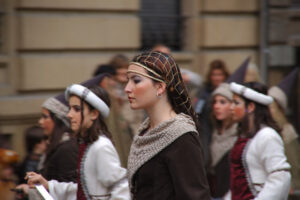Last Updated on October 29, 2025 by | Published: June 5, 2019
Fun fact: you shouldn’t always speak Spanish when in Spain.
We know that sounds weird. Yes, Spanish is the official national language, and in most of the country, it is what you should be making an effort to speak.
But that’s not always the case. A handful of Spain’s 17 autonomous regions have their own regional co-official languages, and the pride for these runs deep—so deep, in fact, that the people who speak them often hold their regional identity in the highest regard, despite officially holding a Spain passport and ID card.
The Basque Country is one such region that’s home to its own completely unique heritage, culture and language. Being able to say a few basic Basque phrases—or individual words—can even take your trip from ona (good), to handia (great)!
Ready to take a deep dive into one of Europe’s most fascinating languages? Here’s everything you need to know.
A tumultuous history
Though but a tiny blip on the linguistic radar of Europe, especially when compared with neighboring languages Spanish and French, the Basque language boasts perhaps a more fascinating history than nearly any other language on the continent. In fact, it’s one of the oldest European languages still in use—so old that even the most diehard language historians have found it difficult to pinpoint where, exactly, it came from.
Part of the problem when tracing the roots of Basque comes from the fact that it shares no connection with any other known language. While most modern European languages stem from clear Indo-European roots, Basque doesn’t—and as a result, its origins have stumped scholars for centuries.
But a language seemingly as old as the world itself is bound to run into a few bumps along the road over the course of several millennia. Less than a century ago, Basque was hovering on the brink of extinction as Spain’s fascist dictator, Francisco Franco, made an effort to snub the language completely in favor of Spanish during the nearly four decades he was in power.
From 1939 until 1975, the use of the Basque language—or euskara—was effectively outlawed. Children learned their ancestral tongue in secret language schools, or ikastolak, which were set up in clandestine locations such as church basements. Those who dared to speak euskara in public risked being overheard by an informant, and penalties often included jail time, public humiliation, and a fine.
Fortunately, the language managed to survive these uncertain decades in the mid-20th century. If anything, the prohibition of euskara only served to give the Basque people an increased sense of pride in their language and culture.
Where is Basque spoken today?
If you’re visiting one of the Basque Country’s “big three” cities —San Sebastian, Bilbao, or Vitoria—it’s unlikely that you’ll hear much Basque being spoken out and about. Due to their status as major tourist hubs for visitors from Spain and beyond, Spanish is overwhelmingly common in these urban areas as the everyday language, though you’ll certainly see plenty of things written in Basque, such as signs and menus.
But head a little further afield, out to the idyllic villages dotting the verdant Basque countryside, and things will start to change. Restaurantes become jatetxeak; coches become autoak. Listen carefully and you’ll hear the staccato sounds of Basque slowly but surely overtaking the rolling familiarity of Spanish.
An estimated 700,000 people speak Basque throughout the region today, a number that is sure to rise in coming years due to the educational model. When it comes to the language of instruction at schools, parents have three choices: primarily in Spanish (with exceptions for Basque language and literature), an equal mix of Spanish and Basque depending on the subject, or primarily in Basque (with exceptions for Spanish language and literature). One thing that’s the same across the board: euskara is mandatory in some way, shape, or form.
Why learn Basque?
We’re not saying you have to learn enough Basque to maintain a vivid, fluent conversation with the adorable grandpas propping up the bar in the tiniest, furthest-flung village in the region where Spanish is all but an anomaly. But even the slightest effort to replace your gracias with eskerrik asko is sure to earn smiles of appreciation from locals, no matter how clumsy your pronunciation may be (and we’ll get to some pronunciation tips in a bit).
Saying that the Basque people are proud of their language is an understatement. In fact, being Basque is so intrinsically tied to the ability to speak Basque that the language features a unique, nearly untranslatable definition for a Basque person.
The word “Euskaldun,” in its purest sense, means something along the lines of “the one that can speak euskara.” But in the Basque Country, it takes on a deeper meaning—it’s often used to mean “Basque” in and of itself.
Using Basque with locals is also seen as a sign of respect—you’re showing that you acknowledge their heritage. When possible, try to use Basque when greeting someone or starting a conversation, then politely switch to Spanish or English.
Basque pronunciation & spelling
Despite its quirks, Basque is a fairly easy language to get the hang of as far as pronunciation and spelling are concerned. Once you familiarize yourself with a few basic rules, you’ll be well on your way to speaking confidently—and avoiding the awkwardness of “Non dago [badly mispronounced Basque place name]?” when asking a local for directions.
Here are a few common Basque phonemes that often trip up non-Basque speakers, as well as a rough approximation of how to pronounce them correctly. When in doubt, ask a local—chances are they’ll love having the chance to help you learn a little bit of Basque.
- tx: “ch”
- tt: similar to the “c” sound in Spanish
- tz: “ts”
- x: “sh”
Useful Basque phrases
Now for the fun part—it’s time to put your Basque language skills to the test in San Sebastian (or wherever in the Basque Country you may find yourself)! Try out a few of these simple Basque phrases and words, and you’ll be well on your way to winning the hearts of locals throughout the region.
- Kaixo: hello (kai-sho)
- Agur: goodbye
- Tori: there you go
- Eskerrik asko: thank you
- Ez horregatik: you’re welcome (some Basque dialects don’t pronounce h)
- Barkatu: excuse me
- On egin: enjoy your meal
- Topa: cheers!
- Zer moduz?: How are you?
- Oso ondo: very good
- Bai/Ez: yes/no
- Jatetxea: restaurant (You may also see the Spanish spelling: jatechea)
- Pinpilinpauxa: butterfly (okay, so this one may not come up during your travels, but it deserves a mention after it was voted the most beautiful word in the Basque language a few years back!)
- Zorte on!: good luck
- Komuna, non dago?: Where are the toilets?
- Ez dakit euskaraz: I do not speak Basque.
- Ba al dakizu ingelesez?: Do you speak English?
- Ez dut ulertzen: I don’t understand.
Want to hear how to pronounce a few of the above Basque phrases (plus a few extras) like a pro? Check out the video below for a crash course in Basque, courtesy of Devour San Sebastian City Coordinator Ania and our friend Jesús from Bar Txepetxa (pronounced “che-pe-cha”—but you knew that now, right?).
Zorte on with your Basque language journey!
Ready to fully immerse yourself in Basque culture (and cuisine)? Our Authentic Basque Cooking Class in San Sebastian will give you a crash course in the region’s legendary gastronomy. Grab an apron and get ready to cook—we’ll show you the secrets of four delicious typical dishes that you can easily recreate no matter where you are in the world!








